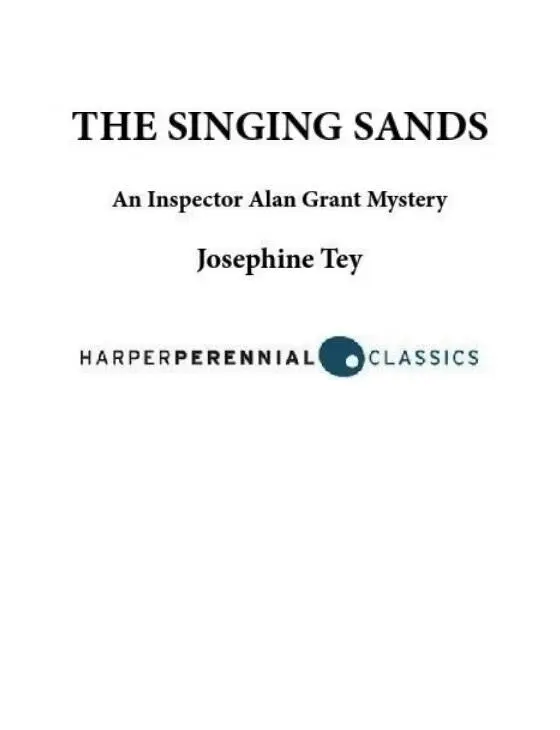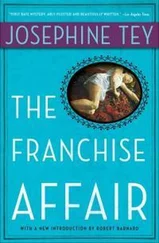Josephine Tey
An Inspector Alan Grant Mystery
THE SINGING SANDS
1952

It was six o’clock of a March morning, and still dark. The long train came sidling through the scattered lights of the yard, clicking gently over the points. Into the glow of the signal cabin and out again. Under the solitary emerald among the rubies on the signal bridge. On towards the empty grey waste of platform that waited under the arcs.
The London mail at the end of its journey.
Five hundred miles of track lay behind it in the darkness all the way to Euston and last night. Five hundred miles of moonlit fields and sleeping villages; of black towns and unsleeping furnaces; rain, fog, and frost; snow flurry and flood; tunnel and viaduct. Now, in the six o’clock bleakness of a March morning the hills had risen round it and it was coming, casual-seeming and quiet, to rest after its long urgency. And only one person in all its crowded length did not sigh with relief at the realization.
Of those who sighed two at least sighed with a gladness that bordered on passion. One of these was a passenger, and the other was a railway employee. The passenger was Alan Grant; and the railway employee was Murdo Gallacher.
Murdo Gallacher was a sleeping-car attendant, and the best-hated living creature between Thurso and Torquay. For twenty years Murdo had browbeaten the travelling public into acquiescence and blackmailed them into tribute. Monetary tribute, that is. Their vocal tribute was voluntary. To first-class passengers far and wide he was known as Yughourt. (Oh God, it’s Old Yughourt! they would say as his sour face became visible through the steamy gloom of Euston.) The third-class passengers called him a variety of things, both frank and descriptive. What his colleagues called him is nobody’s business. Only three people had ever got the better of Murdo: a cowhand from Texas, a lance corporal of the Queen’s Own Cameron Highlanders, and an unknown little Cockney woman in the third-class who had threatened to beat him over his bald head with a lemonade bottle. Neither rank nor achievement impressed Murdo: he hated one and resented the other; but he was greatly afraid of physical pain.
For twenty years Murdo Gallacher had done the absolute minimum. He had been bored by the job before he had been a week at it, but he had found it a rich lode and he had stayed to mine it. If you got morning tea from Murdo the tea would be weak, the biscuit soft, the sugar dirty, the tray slopped, and the spoon missing; but when Murdo came to collect the tray the protests which you had been rehearsing died on your lips. Now and then an Admiral of the Fleet or something like that would venture an opinion that it was damned awful tea, but the ruck smiled and paid up. For twenty years they had paid up, weary and browbeaten and blackmailed. And Murdo had collected. He was now the owner of a villa at Dunoon, a string of fried-fish shops in Glasgow, and a very nice bank balance. He might have retired years ago but he could not bear the thought of losing his full pension; so he endured the boredom a little longer and evened things up by not bothering with early morning teas unless passengers suggested the thing themselves; and sometimes, if he was very sleepy, forgetting about the order anyway. He hailed the end of each journey with the relief of a man who is working out his sentence and has only a short time left.
Alan Grant, watching the lights of the yard float past beyond the steamed-up window and listening to that gentle sound of the wheels clicking over the points, was glad because the end of the journey was the end of a night’s suffering. Grant had spent the night trying not to open the door into the corridor. Wide awake, he had lain on his expensive pallet and sweated by the hour. He had sweated not because the compartment was too hot – the air-conditioning worked to a marvel – but because (O Misery! O Shame! O Mortification!) the compartment represented A Small Enclosed Space. To the normal eye the compartment was just a neat little room with a bunk, a washbasin, a mirror, luggage racks in assorted sizes, shelves that appeared or disappeared as bidden, a fine little drawer for one’s hypothetical valuables, and a hook for one’s presumably unhocked watch. But to the initiate, the sad and haunted initiate, it was A Small Enclosed Space.
Overwork, the doctor called it.
‘Sit back and browse for a little,’ the doctor had said, crossing one elegant Wimpole Street leg over the other and admiring the hang of it.
Grant could not imagine himself sitting back, and he considered browsing a loathsome word and a contemptible occupation. Browsing. A fattening-up for the table. A mindless satisfaction of animal desires. Browse, indeed! The very sound of the word was an offence. A snore.
‘Have you any hobbies?’ the doctor had asked, his admiring glance going on to his shoes.
‘No,’ Grant had said shortly.
‘What do you do when you go on holiday?’
‘I fish.’
‘You fish?’ said the psychologist, seduced from his Narcissian gazing. ‘And you don’t consider that a hobby?’
‘Certainly not.’
‘What is it, then, would you say?’
‘Something between a sport and a religion.’
And at that Wimpole Street had smiled and had looked quite human; and assured him that his cure was only a matter of time. Time and relaxation.
Well, at least he had managed not to open that door last night. But the triumph had been dearly bought. He was drained and empty; a walking nothingness. ‘Don’t fight it,’ the doctor had said. ‘If you want to be in the open, go into the open.’ But to have opened that door last night would have meant a defeat so mortal that he felt there would be no recovery. It would have been an unconditional surrender to the forces of Unreason. So he had lain and sweated. And the door had stayed closed.
But now, in the unrewarding dark of early morning, in the bleak anonymous dark, he was as without virtue as if he had lost. ‘I suppose this is how women feel after long labour,’ he thought, with that fundamental detachment which Wimpole Street had noted and approved. ‘But at least they have a brat to show for it. What have I got?’
His pride, he supposed. Pride that he had not opened a door that there was no reason to open. Oh God!
He opened the door now. Reluctantly; and appreciating the irony of that reluctance. Loath to face the morning and life. Wishing that he could throw himself back on that rumpled couch and sleep and sleep and sleep.
He picked up the two suitcases which Yughourt had not offered to do anything about, tucked the bundle of unread periodicals under his arm, and went out into the corridor. The little vestibule at the end of it was blocked almost to the roof with the luggage of the more lavish tippers, so that the door was nearly invisible; and Grant moved on into the second of the first-class coaches. The forward end of that too was stacked waist-deep with privileged obstacles, and he began to walk down the corridor towards the door at the rear end. As he did so Yughourt himself came from his cubbyhole at the far end to make sure that Number B Seven was aware that they were nearly at the terminus. It was the acknowledged right of Number B Seven, or of any number whatever, to leave the train at his leisure after arrival; but Yughourt had of course no intention of hanging round while someone had his sleep out. So he knocked loudly on the door of B Seven and went in.
As Grant came level with the open door Yughourt was shaking B Seven, who was lying fully dressed on the bunk, by the cloth of his sleeve and saying in choked exasperation: ‘Come on, sir, come on! We’re practically in.’
Читать дальше













